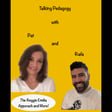Become a Creator today!Start creating today - Share your story with the world!
Start for free
00:00:00
00:00:01

Snow Days! (micro-sode)
Join Emily and Rafa as they talk about snow days and what it means to take them away in favor of distance learning.
Anything, e-mail us at pedagogyofthedistressed@gmail.com!
Rafa & Emily
Transcript
Introduction and Mini-sode Announcement
00:00:01
Speaker
Hola, buenas noches, Emily.
00:00:03
Speaker
Buenas noches.
00:00:04
Speaker
Bien, gracias.
00:00:06
Speaker
¿Cómo estás?
00:00:07
Speaker
Bien, cansadito, but I'm ready.
00:00:10
Speaker
I'm here.
00:00:11
Speaker
Yeah.
00:00:12
Speaker
Well, tonight we're going to have a special mini-sode just to keep something fresh in your ears and also to check in because I love talking with you, as always.
The Evolution of Snow Days: Traditional vs. Distance Learning
00:00:25
Speaker
Yes, a little micro episode.
00:00:28
Speaker
Yeah.
00:00:29
Speaker
So for our micro mini episode, we just thought it'd be cool to focus on topics that are kind of like fluffy and small, but... Literally.
00:00:38
Speaker
Literally for the one we're about to tackle.
00:00:42
Speaker
Fluffy small issue in education that actually...
00:00:45
Speaker
As in, we inevitably do find connections to, you know, macro systemic concerns.
00:00:51
Speaker
So.
00:00:52
Speaker
Hot.
00:00:56
Speaker
Hot take.
00:00:58
Speaker
So I proposed this, so I'll introduce it.
00:01:03
Speaker
We're in the Northeast and we're having a snowstorm tomorrow.
00:01:09
Speaker
And so I'm keeping an eye out on those closings because even though I'm not teaching in schools right now, my husband does.
00:01:15
Speaker
So I'm hoping he gets to stay home.
00:01:17
Speaker
And I was reminded of a change and a shift in the way snow days happen.
00:01:25
Speaker
Where some schools, maybe most, I'm not sure how it is right now, but I know when it first started when in the days of COVID and online learning, I mean, not in the days of COVID as if it's past, but like COVID restrictions in schools, distance learning became more part of schools.
00:01:41
Speaker
And as such, snow days became distance learning days, as I'm sure we've all experienced in a lot of schools.
Perspectives on Snow Days and Online Capabilities
00:01:47
Speaker
And up here, especially that school year of 2020 to 2021, you know, like that first year everyone was back, but like there were a lot of modifications to how school was.
00:02:03
Speaker
There was not like a universal agreement about whether snow days should be snow days where kids didn't have to do work.
00:02:11
Speaker
They were just...
00:02:13
Speaker
you know, allowed to do whatever they wanted.
00:02:16
Speaker
And then there was another camp that thought, no, we need to save this day, especially because half the kids are in school, half the days, half are not.
00:02:22
Speaker
And what's the difference if they're learning online from the teachers at home or from the teachers in school, it
Nostalgia and Policy Disparities in Snow Day Handling
00:02:29
Speaker
doesn't matter.
00:02:29
Speaker
You know, like it can still be a day of learning.
00:02:31
Speaker
So we should make it a distance learning day, not a snow day.
00:02:35
Speaker
And it sparked a lot of debate at the time.
00:02:38
Speaker
Now I think it's just become normalized that a lot of schools do a distance learning day on a weather day when it's not physically safe to come to school.
00:02:47
Speaker
And I feel a hundred different ways about it.
00:02:49
Speaker
Oh, me too.
00:02:51
Speaker
Now that you're saying it.
00:02:52
Speaker
Yeah.
00:02:53
Speaker
You know, from a teacher's perspective, I was obviously enraged that I was expected to teach on snow days because there were lots of concerns.
00:03:03
Speaker
Like one, I just thought it was like so tedious already to do online learning.
00:03:08
Speaker
It was very challenging to do 100% online for kids.
00:03:13
Speaker
I'm not sure what you've experienced, but.
00:03:15
Speaker
Yeah, it was not.
00:03:18
Speaker
It was not great.
00:03:20
Speaker
Yeah, it was challenging for them to be engaged.
00:03:24
Speaker
And I think Rafa and I both have a strong commitment to experiential, like hands-on learning and play learning, play-based learning.
00:03:31
Speaker
And in my mind, I know it's not the case for all children, but like snow days were a really magical kind of free day where you just got an unexpected gift of staying
Challenges of Distance Learning and Resource Disparities
00:03:40
Speaker
home and playing out in the snow all day.
00:03:42
Speaker
And, you know, it's like...
00:03:48
Speaker
Not all kids have access to a safe place to play outside and play in the snow, but a lot of kids can find a park or find a place to play.
00:03:57
Speaker
A lot of my kids, when I taught in Providence, missed snow days.
00:04:01
Speaker
They told me they missed them.
00:04:04
Speaker
This nostalgia for snow days...
00:04:07
Speaker
Stuck in some towns in the wealthy white town where my partner taught at the time, the principal came around or the superintendent came around and said, it's, you know, we're going to keep the spirit of a snow day.
00:04:22
Speaker
We're not doing distance learning days.
00:04:23
Speaker
We're going to let kids be kids outside.
00:04:26
Speaker
And yeah,
00:04:28
Speaker
That was a pattern at private schools.
00:04:30
Speaker
That was the case.
00:04:31
Speaker
Not all, it's not ubiquitous, but many private schools I knew people taught at.
00:04:36
Speaker
Other wealthier majority white districts did this like keep the spirit of snow days alive kind of thing.
00:04:44
Speaker
And I, in my school, was told I had to teach online.
00:04:47
Speaker
I had to post something in my Google classroom and that administrators would be coming on and checking to make sure I was teaching.
00:04:55
Speaker
it was very par for the course of that year, especially pretending that everything was normal and nothing had changed.
00:05:02
Speaker
And this philosophy that like doing so is in the children's best interest because it kept continuity.
00:05:07
Speaker
It kept like
00:05:08
Speaker
the sameness.
00:05:09
Speaker
It kept high expectations, right?
00:05:11
Speaker
That was like a big buzzword that like we have high expectations for our learners and like, you know, they didn't say this, but the ethos was through sleep, through snow, like we will go and like learn, you know?
00:05:24
Speaker
And it's just like,
00:05:26
Speaker
I felt like as a kid growing up in New England, I didn't grow up anywhere else.
00:05:30
Speaker
I don't know what it was like, but that was like a rite of passage was like these days off to like where your parents like had to stay home because they couldn't leave, you know, and you just like had a day off from responsibility.
00:05:45
Speaker
I mean, school –
00:05:47
Speaker
Schools work.
00:05:48
Speaker
Kids deserve a break too.
00:05:52
Speaker
Those really unexpected moments of joy.
00:05:55
Speaker
I was talking to my neighbor today who was eight years old and he was telling me that he was so excited.
00:06:02
Speaker
He was hoping it was a snow day tomorrow.
00:06:03
Speaker
He's going to sleep with his pajamas inside out.
00:06:05
Speaker
There's something like...
00:06:08
Speaker
There's something like magical and just like about the unexpectedness of a snow day.
00:06:14
Speaker
You know, it's like, obviously there's some scary things that can go along with it, like scary weather patterns, but like, you know, I don't know.
00:06:22
Speaker
I just felt like the of coarseness of it all that, of course, my district already very punitive made us do on and like bent on surveilling us, like had this approach to snow days and hint, hint, nothing happened.
00:06:37
Speaker
Yeah.
00:06:38
Speaker
on these snow days.
00:06:40
Speaker
Nobody did anything because also the other part of it was
00:06:44
Speaker
I had those concerns about the spirit of the snow day.
00:06:46
Speaker
And then also like a lot of my kids were learning from homes with poor internet connectivity.
00:06:51
Speaker
So it didn't matter.
00:06:52
Speaker
It's like distance synchronous learning was not easy for them.
00:06:56
Speaker
Their cameras would fade in and out.
00:06:58
Speaker
If there was bad weather and power
Systemic Inequalities and School Expectations
00:07:00
Speaker
was down, their internet would go out, you know?
00:07:02
Speaker
So it became this like exacerbation of like, you know, inequity and like, uh,
00:07:10
Speaker
just we didn't have the infrastructure to actually provide high quality synchronous online learning for kids you know in our school and so it just became like oh you missed a day because you weren't on school during the snow day you know um and i just am like i'm just exhausted that that's like still a thing that it's a distance learning day it's a day on not a day off you know yeah no i i feel like i talked a lot
00:07:37
Speaker
I resonate a lot with this idea of the spirit of a snow day.
00:07:41
Speaker
And I think about what about the spirit of a snow day attracts me.
00:07:44
Speaker
And I think it's like, so schools, by and large, are very much mirroring the capitalist system we live in, right?
00:07:53
Speaker
Where you're working, you're on a clock.
00:07:57
Speaker
Yeah.
00:07:59
Speaker
And so snow days in many ways are like one of the were in some places still are one of those few places of like, wow, I can enjoy.
00:08:11
Speaker
Not.
00:08:12
Speaker
Yeah.
00:08:12
Speaker
Like, and so like in that, in that talk of high expectations always bothers me because so many times it's high expectations of what, like,
00:08:24
Speaker
Of what?
00:08:24
Speaker
High expectations for children to deal with and have basically high expectations of children with very low expectations of the systems they work in.
00:08:36
Speaker
Yeah.
00:08:36
Speaker
Like, what the hell?
00:08:38
Speaker
Yeah.
00:08:39
Speaker
And it's just really annoying narrative.
00:08:41
Speaker
Yeah.
00:08:42
Speaker
That's exacerbated by these things of, okay, yeah, come like hell or high water, like...
00:08:47
Speaker
we're going to have high expectations and instead of almost like accepting that like no that's work that needs the fact that there's such poor infrastructure is a bigger issue and not again I'm not trying to be like saying that we resign ourselves not doing anything but also like
00:09:06
Speaker
Accept things for what they are and then try to change things from there.
00:09:10
Speaker
Accept that, I don't know, improper funding has led to a situation where there's not a good electric grid, for example, or proper internet or such.
00:09:21
Speaker
Right.
00:09:23
Speaker
So I am all about the spirit of a snow day and the spirit of having a high expectation of people being able to enjoy and benefit from downtime.
00:09:34
Speaker
Yeah.
00:09:35
Speaker
So I think, yeah, I think this whole snow days and distance learning or whatever cost and the context of like, especially with younger children and including middle school age is a little bit like,
00:09:48
Speaker
it's like work.
00:09:49
Speaker
It's like, like you were saying, like, it's like how work expects you to work many times.
00:09:53
Speaker
Yeah.
00:09:54
Speaker
Yeah.
00:09:56
Speaker
And it's just like the extra surveillance.
00:09:59
Speaker
It's like,
00:10:00
Speaker
It's almost easier.
00:10:02
Speaker
It is easier for administration to pop onto your call than it is for them to walk into your classroom because they're not in meetings all day.
00:10:11
Speaker
You know, their meetings probably got canceled or, you know, shifted around.
00:10:14
Speaker
Like all they have to do is hop on whenever you're not expecting it and, you know, see what you're doing.
00:10:21
Speaker
You know, I've had the experience of, you know, in again, that 2020 to 2021 school year, we had a two week,
00:10:28
Speaker
remote, you know, or not even too weak, a week long remote learning stint before Christmas.
00:10:35
Speaker
And
00:10:38
Speaker
it was like two or three days before the winter holiday break.
00:10:42
Speaker
And none of my kids were coming on.
00:10:44
Speaker
Like it was just, everyone was done.
00:10:47
Speaker
You know, we were all burned out emotionally and physically from this crazy year.
00:10:51
Speaker
And in the last like 20 minutes, one of my classes and admin came on and was like, you know, there was no children on the phone call.
00:10:59
Speaker
And I was just like sitting alone on a call and had to be like,
00:11:04
Speaker
yeah, no kids came.
00:11:06
Speaker
I don't know what to do.
00:11:08
Speaker
And I didn't say this, but it's like, I stopped calling their parents and like home, you know, three days ago.
00:11:15
Speaker
Like, this is my gift to them.
00:11:16
Speaker
You know, it's like, I don't care.
00:11:18
Speaker
Like, you know, and but it's like, what did your admin say?
00:11:27
Speaker
Oh, nothing.
00:11:27
Speaker
They were pretty done too.
00:11:29
Speaker
Thankfully, I had a very understanding and tired admin, but they had to check a box that said, I checked in on this person, this person, this person, this person, right?
00:11:39
Speaker
And...
00:11:42
Speaker
Yeah, it's just like evident to me that not much learning happens on these distance learning days.
00:11:46
Speaker
And there's this argument that, oh, you save days in the summer.
00:11:49
Speaker
It's like you don't have to take extra days into the summer.
00:11:51
Speaker
But we used to just build in like, well, you can have up to five school days and not miss, you know, not have to go into the summer.
00:11:58
Speaker
It's like these things have been built in for and it's just like –
00:12:02
Speaker
Having five extra distance learning days is not going to like close what some term the achievement debt or not achievement debt, the achievement gap, right?
00:12:12
Speaker
What I would call the achievement debt or Gloria Ladson Billings, like the amazing, you know, theorist who came up with and researcher who came up with culturally relevant pedagogy.
00:12:27
Speaker
She termed like we should think of,
00:12:29
Speaker
not the achievement gap, like, right about an achievement debt, but like what is owed to students of color.
00:12:36
Speaker
And either way you look at it, it's not going to be closed by, you know, five.
00:12:42
Speaker
I mean, also five, five extra days of work is five days that I'm not, and we're not resting.
00:12:49
Speaker
Yeah.
00:12:50
Speaker
Yeah.
00:12:50
Speaker
We're tired.
00:12:51
Speaker
We're just more tired.
00:12:52
Speaker
I know.
00:12:53
Speaker
I know.
00:12:54
Speaker
I know.
00:12:54
Speaker
Yeah.
00:12:55
Speaker
So yeah.
00:12:57
Speaker
Yeah.
00:12:58
Speaker
Listen to me.
00:13:01
Speaker
I'm losing my function as well.
00:13:02
Speaker
Does mi casita do snow days?
00:13:06
Speaker
Yeah, we go by the DOE.
00:13:09
Speaker
So New York City, DOE closes, we close.
00:13:13
Speaker
You could make an argument that it doesn't make as much sense because our families for the most part are local.
00:13:19
Speaker
Like you could walk.
00:13:20
Speaker
Right, right.
Schools as Educational and Social Safety Nets
00:13:22
Speaker
That being said, our whole team isn't local.
00:13:26
Speaker
That's the thing.
00:13:27
Speaker
Yeah.
00:13:28
Speaker
Think of if, and then it makes it tricky to have a policy of like, if the team is, if the team this year working this year is works in a night works in the neighborhood, it's like, yeah, that's not sustainable.
00:13:41
Speaker
So,
00:13:43
Speaker
But honestly, it's really few and far between.
00:13:45
Speaker
The DOE in New York City just doesn't close very reliably.
00:13:48
Speaker
Yeah.
00:13:50
Speaker
It's funny.
00:13:50
Speaker
Someone asked me yesterday, a friend of mine who's not a teacher, why is it so hard for them to close?
00:13:56
Speaker
And I'm like, well, there's lots of implications, one of which is that it's for a lot of people, especially in economically oppressed situations, that school is maybe we're going to get the most amount of heat and food in a day.
00:14:09
Speaker
Right.
00:14:09
Speaker
And so...
00:14:11
Speaker
Again, schools taking on the inequities that exist in the rest of society, right?
00:14:17
Speaker
Right.
00:14:18
Speaker
It's not all about learning is what I'm saying.
00:14:21
Speaker
Yeah.
00:14:21
Speaker
Speaking.
00:14:22
Speaker
I'm not trying to make a judgment on good or bad.
00:14:27
Speaker
Well, I do have a judgment.
00:14:28
Speaker
I don't think schools should be expected to do that because...
00:14:33
Speaker
How do I explain it?
00:14:34
Speaker
You do what you got to do in the short term, the reduced harm.
00:14:38
Speaker
But this idea that that's a long-term solution, you just have to keep doing it, and that's going to eventually lead to a solution that's more sustainable, that's delusional.
00:14:46
Speaker
And that's what's been done for so long.
00:14:48
Speaker
And so that's what I'm trying to... I don't know if that makes sense.
00:14:51
Speaker
That's what I'm trying to say.
00:14:52
Speaker
Yeah, yeah.
00:14:53
Speaker
And I think that also...
00:14:56
Speaker
my dis like my ire about like this, like what it would make me so mad about having to do a distance learning dance of just having a motherfucking snow day.
00:15:07
Speaker
Um, was that, um,
00:15:11
Speaker
This idea that, oh, we can still do school from home.
00:15:17
Speaker
It's like the whole argument against keeping schools open during COVID was that it like – because what you said, school is a social safety net.
00:15:26
Speaker
It's the only place kids have a full – might have like breakfast and lunch.
00:15:31
Speaker
It's the place where they might –
00:15:33
Speaker
have access to a comfortable environment, you know, in a day or a caring adult or an adult who's able to like advocate for them or something.
00:15:43
Speaker
Right.
00:15:43
Speaker
And it's like, that's the argument for having kids come to school.
00:15:46
Speaker
That was a big part of it.
00:15:47
Speaker
And to me, what I was seeing was that
00:15:51
Speaker
we weren't doing any of that sociocultural, you know, work.
00:15:56
Speaker
It was all, not sociocultural, but like emotional, socioemotional work.
00:16:02
Speaker
It's like, oh no, I'm still just expected to teach academic, like, you know, like the common core standards for the day, like the, you know, whatever writing skill, whatever reading skill you needed for the day.
00:16:15
Speaker
It's like, that's what school is about in the most basic essence to a lot of
00:16:21
Speaker
people, you know, and to think that you can make, it just was contradictory.
00:16:27
Speaker
It's like, you can't have both be the, you can't force us to come into school under the guise of it's important for kids to be in school.
00:16:34
Speaker
And then also say, you can like do the same thing you do in schools at home, like from the computer and do a distance learning day.
00:16:42
Speaker
And you can't, whatever.
00:16:44
Speaker
It's clear like schools and teachers do so much more that is relational.
00:16:48
Speaker
And we're just like,
00:16:51
Speaker
that commitment to distance learning really solidified to me what some people's like ideas of school were that they're like a little factory, you know, just turning out filled, you know?
00:17:05
Speaker
Yeah.
00:17:09
Speaker
Well, this is in Minnesota.
00:17:10
Speaker
We're at minute 17.
00:17:12
Speaker
We riffed on it good.
00:17:13
Speaker
We riffed.
00:17:15
Speaker
Yeah, I didn't expect to make the connections I did through when you brought it up first.
00:17:20
Speaker
So that wasn't interesting and exciting.
00:17:21
Speaker
Thank you.
Conclusion and Call for Feedback
00:17:23
Speaker
Yeah.
00:17:24
Speaker
Well, if you have feelings, you can email us.
00:17:27
Speaker
at pedagogy of the distressed at gmail.com.
00:17:31
Speaker
And we'd love to hear your thoughts.
00:17:33
Speaker
Yeah.
00:17:34
Speaker
If you did anything really cool on a snow day, we'd love to hear about it.
00:17:37
Speaker
Yes.
00:17:37
Speaker
Let's celebrate snow days.
00:17:39
Speaker
Let's celebrate snow days.
00:17:42
Speaker
All right.
00:17:43
Speaker
Well, you go get some rest of the tools, your entire teacher.
00:17:47
Speaker
Yes.
00:17:48
Speaker
And you too.
00:17:49
Speaker
Thank you.
00:17:50
Speaker
Okay.
00:17:51
Speaker
Pray for snow.
00:17:53
Speaker
Pray for snow day.
00:17:54
Speaker
Pray for snow for you.
00:17:55
Speaker
We're definitely not getting a snow day tomorrow.
00:17:57
Speaker
It's only three inches in New York City.
00:17:58
Speaker
So you put your PJs on inside out for us.
00:18:00
Speaker
Apparently not.
00:18:01
Speaker
That's what my eight-year-old neighbor said we needed to do.
00:18:04
Speaker
That's what I have to do then.
00:18:04
Speaker
Okay.
00:18:06
Speaker
All right.
00:18:07
Speaker
Bye.
00:18:07
Speaker
Bye.
00:18:07
Speaker
Bye.
00:18:07
Speaker
Bye Bye.
00:18:07
Speaker
Bye.
00:18:07
Speaker
Bye.
00:18:07
Speaker
Bye Bye.
00:18:08
Speaker
Bye.
00:18:08
Speaker
Bye Bye.
00:18:08
Speaker
Bye Bye.
00:18:08
Speaker
Bye Bye.
00:18:09
Speaker
Bye Bye.
00:18:09
Speaker
Bye Bye.
00:18:09
Speaker
Bye Bye.





